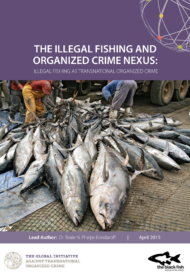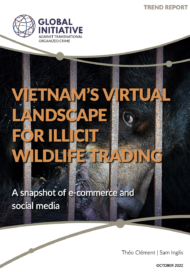Posted on 09 Nov 2015
Photo: Fishermen rescued from a boat on which they were trafficked to work (Pring Samrang/Reuters)
A court in São Tomé and Príncipe, a small oceanic island off the African west coast, recently delivered an historical verdict in the fight against the transnational criminal syndicates involved in fisheries crime.
The court convicted the Chilean captain and two Spanish officials of the Thunder, a Nigerian-flagged vessel considered to be one of the world’s worst illegal fishing ships. They were sentenced to spend up to three years in jail and to pay a fine of approximately 15 million euros. The charges related to recklessness, forgery, pollution and damage to the environment.
The judicial outcome is a major victory even if the charges reflected only part of the illegal activities attributed to the Thunder. This is the second-most high-profile case of fisheries crime in history after the 2013 Bengis case involving the massive poaching of South African rock lobster.
The process to arrest the Thunder involved a host of countries and global agencies as well as NGOs. The Thunder was tracked by various countries. There was a wide transnational co-operative effort led by Interpol.
But the main player of the dramatic finale of the Thunder case was the non-governmental organisation Sea Shepherd. Sea Shepherd chased the vessel for 110 days over 10,000 miles from Antarctica to the Gulf of Guinea. This was where the Thunder sank, presumably intentionally to destroy evidence.
This landmark case reveals some of the many challenges in the fight against fisheries crime.
What is fisheries crime?
There is no common legal definition of fisheries crime in international law. It has to be distinguished from the legal concept of illegal, unreported, and unregulated fishing.
The term “fisheries crime” recently appeared in the context of emerging practical responses against offences committed within the fisheries sector. This was the topic of the first international gathering of experts on fisheries crime called the FishCRIME Symposium recently held in Cape Town.
Offences include severe cases of illegal fishing, related offences from document fraud, to corruption and tax evasion but also human trafficking in the fisheries sector. By definition, these offences are hard to detect and prosecute as they are committed in secrecy and across national borders or on the high seas.
Fisheries crime threatens marine ecosystems and has consequences for fish stocks. It has an impact on food security and sustainable fishing by coastal communities around the world. It also deeply affects human lives when it entails forced labour of trafficked fishermen.
As a revealing example, organised criminal groups lure Cambodian men to join fishing vessels. They end up working without pay and have no way of escaping.
New approaches needed
There is a growing awareness that fisheries crime is not only a “green issue”. It won’t be curbed only by using regulatory measures and fisheries agencies. A change of mentality is needed to fully address it as a form of transnational organised crime.
National and transnational co-operation between multiple agencies is critical. At the national level there is often a need for better collaboration between fisheries agencies, the police, the judiciary, customs, tax, ports, security and labour authorities. Transnational co-operation is also paramount. This global threat will be addressed only if source states, flag states, coastal states and market states work together.
The United Nations Office on Drugs and Crime has developed tools for cooperation in fighting transnational environmental crime. They could be used to fight fisheries crime. Interpol has gone beyond its traditional role of assisting national police authorities in sharing intelligence by conducting joint operations as part of its project SCALE.
Regional cooperation also plays an important role with initiatives such as the Fish-I Africa Task Force, to mention only one of the most innovative African mechanisms. But in many cases these emerging tools need to be reinforced and appropriately funded.
A number of non-governmental organisations are also actively participating in the fight against fisheries crime by leading their own investigations and operations. Interpol officials realise that NGOs are key allies but they have concerns about the risks created and the fact that sometimes the methods used by NGOs might go beyond the boundaries of legality, for instance in collecting evidence.
This was discussed at the recent Interpol Fisheries Crime Working Group meeting in Cape Town with civil society organisations. NGOs help in alerting authorities and providing valuable information. But the limits in sharing information were explained as police officials are often prohibited by law to give feedback on ongoing investigations.
Stronger political commitment urgently needed
Many experts share the opinion that the tools to combat the problem are there. But a lack of commitment by many states is the main challenge. For many governments, fisheries crime is not a political priority.
There is a lack of awareness on the seriousness of the issue. The absence of a common legal definition does not help. A broader debate on the improvement of legal frameworks at international and domestic levels is required. Many countries are still dealing with these matters through fisheries regulations. But only appropriate criminal legislation will deter organised criminal networks.
Innovative thinking is also needed to find additional ways to address the issue as the fight against fisheries crime won’t be won using law enforcement approaches only. Policing the vast oceans and seas is simply too challenging and expensive.
Involving all the operators of the fishing industry and raising awareness among consumers are essential strategies. In the long run fisheries crime will be curbed only if we break down its business model by making it a high risk, low reward activity.
Note: this piece was originally published in The Conversation



